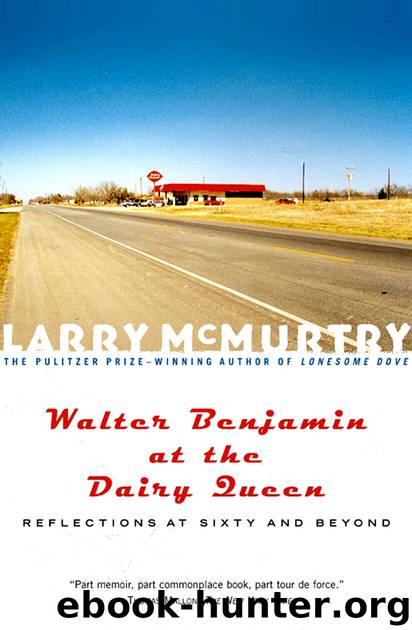Walter Benjamin at the Dairy Queen by Larry McMurtry

Author:Larry McMurtry
Language: eng
Format: epub
Publisher: Simon & Schuster
Published: 1999-08-09T16:00:00+00:00
2
THE FIRST book I read that belonged indubitably to world literature was Don Quixote. How I came by it, or exactly when, or what edition I read, I cannot now remember. Probably I was about thirteen, a ranch boy who had never had a really good book to read before. (Not everyone agrees that it is a great book: Edmund Wilson, an admitted Iberophobe, thought it a bore and said as much to Harry Levin, prompting that scholar’s classic rejoinder, “Harvard disagrees.”)
It is clear that Edmund Wilson, a Princeton man, didn’t give a shit whether Harvard disagreed or not. Mario Praz also had his problems with Iberian culture, though I don’t recall that he particularly disliked Cervantes, as Edmund Wilson did.
For myself, stumbling on Don Quixote was a profound experience, although I could not have said why at the time. I just knew that Don Quixote was different in kind from Sergeant Silk, the Prairie Scout or Poppy Ott and the Stuttering Parrot. Oddly, since I have a book scout’s visual memory of almost every book I’ve seen, I have no memory at all of what my first Don Quixote looked like, though I do remember my second copy, a Modern Library Giant, purchased at around age eighteen. All I can remember about my first reading is that I did it in the loft of the barn, a place I often retreated to to read, partly because of the privacy, partly because I enjoyed being high up, where I could look north and south and see the whole ranch. Although poultry had largely ceased to be a threat by that time, I still liked to climb above their cacophony when possible.
From the loft of the barn, or from the little platform on top of the windmill, I could look north into the Great Plains and do some serious daydreaming. Probably one of the reasons for my immediate identification with Don Quixote and Sancho was that they went horseback across a plain. Also, at least in the first part, their misadventures often involved animals, as mine did. Horses were always kicking them, a danger one had to prepare for if one has horses around. I could readily identify with the landscape, with the two men’s mode of travel. They were clearly in sheep country, not cattle country, but not being a real cowboy, I was never able to acquire the prejudice against sheep that many cattlemen have. (In Archer County there were then no sheep to be prejudiced against.) Also, we had a windmill, and I could readily understand how someone who was a little deranged might mistake it for a giant.
Moving down yet one more level of the story, I also responded to the classic opposition of types, Don Quixote and Sancho Panza, the visionary and the practical man; in this pairing I soon gave my loyalty to Sancho. I felt like the practical man myself, in constant conflict with visionaries—or at least one visionary, my keeper, my Jeeves, my constant companion, the elderly cowboy Jesse Brewer.
Download
This site does not store any files on its server. We only index and link to content provided by other sites. Please contact the content providers to delete copyright contents if any and email us, we'll remove relevant links or contents immediately.
Cecilia; Or, Memoirs of an Heiress — Volume 2 by Fanny Burney(31934)
Cecilia; Or, Memoirs of an Heiress — Volume 3 by Fanny Burney(31925)
Fanny Burney by Claire Harman(26591)
We're Going to Need More Wine by Gabrielle Union(19030)
Plagued by Fire by Paul Hendrickson(17400)
All the Missing Girls by Megan Miranda(15922)
Cat's cradle by Kurt Vonnegut(15324)
Bombshells: Glamour Girls of a Lifetime by Sullivan Steve(14046)
For the Love of Europe by Rick Steves(13854)
Leonardo da Vinci by Walter Isaacson(13304)
4 3 2 1: A Novel by Paul Auster(12363)
The remains of the day by Kazuo Ishiguro(8965)
Adultolescence by Gabbie Hanna(8909)
Note to Self by Connor Franta(7663)
Diary of a Player by Brad Paisley(7544)
Giovanni's Room by James Baldwin(7315)
What Does This Button Do? by Bruce Dickinson(6194)
Ego Is the Enemy by Ryan Holiday(5409)
Born a Crime by Trevor Noah(5367)
